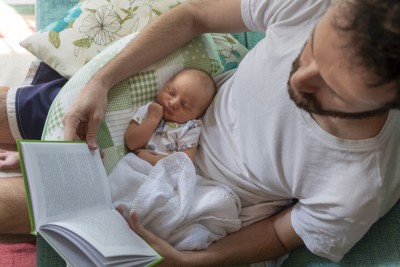Those who mourn and the sanctity of life

During my wife’s first pregnancy, our doctor identified some irregularities in an early ultrasound. He informed us that these irregularities meant our child would be born with a genetic disorder. We were getting our care at a Catholic healthcare system that had specific beliefs regarding abortion and precluded the procedure within the system. Our doctor encouraged us to move to a non-Catholic system. In his round-about way, he was recommending that we terminate the pregnancy. We didn’t. My son was born in 2005, and today, he is a healthy teenager who brings a great deal of joy to our family.
Not terminating the pregnancy was an easy decision. Dealing with the emotions associated with the potential of having a child born with significant challenges was not. It was one of the few moments in my life when I have felt true despair. I called several friends to ask for prayer and wisdom. One gave me a piece of advice that has formed me into who I am and how I think to this day. He told me that I needed to mourn the child I thought I was going to have and embrace the child that God was going to give me.
I took his advice. I grieved the loss of the child and life I had envisioned. In the process, I came to see that I had created a self-serving fantasy. In my innocent fiction, I was a wonderful father who raised a son who would avoid all the mistakes I had made. He would achieve everything I hadn’t.
He would be, in many ways, my “redemption.” By mourning my fantasy, I came to understand Old Testament theologian Walter Brueggemann’s insight regarding the connection between criticism and grief: “The grieving of Israel — perhaps self-pity and surely complaint but never resignation — is the beginning of criticism. It is made clear that things are not as they should be, not as they were promised, and not as they must and will be. Bringing hurt to public expression is an important first step in the dismantling criticism that permits a new reality, theological and social, to emerge.” Mourning the loss of my distorted fantasy led to a critique and correction of my own depraved imagination.
This connection between mourning and critique is crucial because mourning, as New Testament scholar Philip Esler argues, is “a behavior. . .characteristic of the group” that claims to follow Jesus. While moral outrage and zeal for justice can be appropriate orientations for Christians in the world, we are “those who mourn” (Matthew 5:4). We mourn because we see the broken world all around us. As author Rudolf Schnackenburg said, we are a people who grieve over the broken state of the world and “groan under the burden of sorrow and guilt”.
Yet our mourning cannot end, as is suggested by the five stages of grief, in acceptance. Because our mourning is a recognition of the ways that the world is not right, we must allow our mourning to prompt critical reflection. Mourning acknowledges that pain and sorrow are part of our sinful state. Criticism considers the ways we can more faithfully testify to God’s presence in the world. Mourning and criticism offer us one means by which we can “learn to do good; seek justice, correct oppression; bring justice to the fatherless, plead the widow’s cause” (Isa 1:17).
In seeking to honor the sanctity of human life, our desire for justice, however legitimate, should not crowd out the grief we feel as we watch those made in God’s image adopt diminished and distorted notions of human dignity. While pro-life conversations are often juxtaposed with pro-choice arguments within the context of the abortion debate, the sanctity of life cannot be limited to conversations about abortion, particularly to political conversations about abortion. We must take care to privilege the theological significance of the phrase “sanctity of life” even as we interact in the political realm.
Life’s sanctity is a theological maxim. We cultivate and enhance human dignity through conversion and discipleship. It is also a legal doctrine used in contexts associated with the government’s role in promoting justice. Diminishing the theological import of life’s sanctity would blunt the church’s witness to Christ as would eliminating its significance to the promotion of justice by political authorities. Life’s sanctity is not a single realm issue. It requires more than a single realm approach.
While abortion, immigration, racism, and sexism have become staples within political discourse, the government’s scope of authority cannot address the root cause of these challenges. Sin is dealt with in the person and work of Christ. God’s people proclaim Christ’s victory over sin and death as we practice “pure and undefiled” religion “before God the Father” (Jam. 1:27). When we mourn the denial of life’s sanctity with all its theological significance, we are led back to the cross. We are led back to the sort of discipleship that shapes us into women and men capable of loving God and loving neighbor in concrete ways.
There are endless ways to diminish life’s sanctity. From human trafficking and widespread access and use of pornography to slandering neighbors on social media and engaging in practices that violate God’s prohibition against partiality deny human dignity. As such, we would do well to learn to mourn and to lead others into mourning so we can redirect our misdirected desires and reshape our understanding of human purpose and dignity.
Such mourning will surely prompt us to resist practices such as abortion, partiality, lust, greed, and idolatry as a means of promoting the sanctity of life. But it will also prompt us to offer care when others might find it distasteful and inconvenient to do so (Lk 10:25-37). Let us honor life’s sanctity by allowing our grief for a broken world to give way to building the church through discipleship, performing acts of love and pursuing justice as we wait for a time when there is “no more death or mourning or crying or pain” (Rev 21:4).
Dr. James Spencer currently serves as President of the D. L. Moody Center, an independent non-profit organization inspired by the life and ministry of Dwight Moody and dedicated to proclaiming the gospel and challenging God’s follow Jesus. His book titled “Useful to God: Nine Lessons from the Life of D. L. Moody” will be released in 2022. He previously published “Thinking Christian: Essays on Testimony, Accountability, and the Christian Mind,” as well as co-authoring “Trajectories: A Gospel-Centered Introduction to Old Testament Theology.”



























